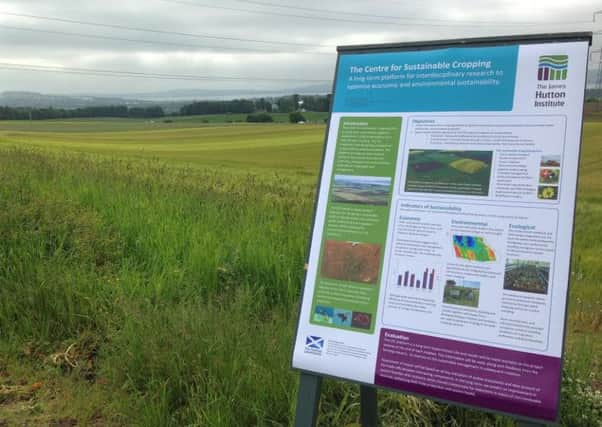Participants full of beans at LEAF technical day


However, the fact that beer can be made from a legume typifies the thinking which is driving forward the development of the 425-acre Balruddery unit as a recognised large scale experiment in sustainable farming.
Six fields on the farm, three on either side of a shallow valley, are part of a project scheduled to last at least 18 years or three rounds of a six course rotation. Half of each field is farmed conventionally and the other half sustainably using a variety of techniques to improve soil quality and biodiversity.
Advertisement
Hide AdAdvertisement
Hide AdBeans can hardly be improved on in terms of nitrogen fixing from the atmosphere, hence their place in the rotation. Research scientist Euan James has measured up to 200kg per hectare (kg/ha) of nitrogen being fixed from the atmosphere by the root nodules on the bean crop with around 50kg/ha being available to boost the following cereal crop.
There are of course concerns about lateness of harvest but the point of the beer experiment was to prove the versatility of the crop beyond simply being a protein replacement for imported soya.
Elsewhere on the site Adrian Newton has been experimenting with mixed autumn sown cereal and legume crops. The idea is that the fixed nitrogen from the pulse crop is immediately available to the companion cereal crop. Dr Newton has used wheat, rye, barley and oats in combination with winter peas and winter beans and will measure the weight of biomass produced at the end of the summer.
The field scale plots will be baled and wrapped for use as a livestock feed but further development may see the crops combined and the seeds mechanically separated.
Much thought has also gone into developing field margin systems. Hutton farms manager Euan Caldwell was so concerned about water run-off and soil erosion down the crop tramlines that he considered drilling the headland margins as he would for a potato crop but sowing the ground with grass or wild birdseed mixtures.
He soon realised that water might instead simply run down the ridge bottoms so he refined the technique to include a tied ridging machine which forms mini-dams at regular intervals down the rows, thus holding back the water.
